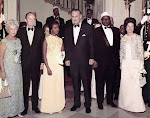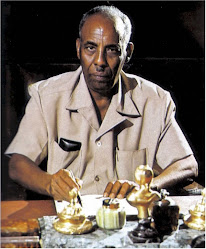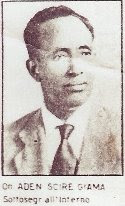 The current Transitional Federal Institutions existed over 7 years without producing an outcome that is acceptable to the people of Somalia. Why Somalia is still not having functioning institutions that can bring peace and stability? This is a genuine question that we all want to know the answer. Despite of this, one of the possible reasons is due to lack of genuine leadership.
The current Transitional Federal Institutions existed over 7 years without producing an outcome that is acceptable to the people of Somalia. Why Somalia is still not having functioning institutions that can bring peace and stability? This is a genuine question that we all want to know the answer. Despite of this, one of the possible reasons is due to lack of genuine leadership. Somalis currently discuss leadership qualities in every social setting. The question of leadership has emerged as the Transitional Federal Institutions mandate is coming to an end on 20 August 2011.
Leadership is vital, to the success of any government or organization and is paramount to our daily life either at work, home or socializing. It is common to hear the rhetoric of Somalis highlighting that high quality leadership is vital to the success of any government or institution. Collins new English dictionary defines “Leader as a person who rules, guides, or inspires others”.
In October 2004 we have witnessed a historic moment where most of warlords became legislators, and Somalis thought this was the beginning of the end of lawlessness in the country. However, due to many factors there are still no functioning institutions in the country, and it can be said the security and the humanitarian situation got worse and worse by the day.
If Transitional Federal Institutions agree to hold an election before August 2011, then it is obvious that the current parliament cannot produce a genuine leader that can make a difference to the country. The parliament unilaterally extended its term for 3 years on 3 February 2011, however, the president, the cabinet, the Somali people and the International Community rejected this decision. One of the reasons at least from the International Community was that the decision lacked proper consultation with all stakeholders. The cabinet has also unilaterally agreed to extend their term for 12 months. In any case, all concerned parties agree the urgent need to extend the term of the institution in order to avoid vacuum.
They also agree that there is an urgent need to reform the parliament by reducing its number and ensuring to select individuals that are accountable to its people and have credibility to its people. For the last 7 years the parliament never functioned as an institution. Therefore, it is absolutely necessary to select leaders that can understand the processes required to produce for an institution.
There are over forty presidential candidates and one would expect that they produce their policies and strategies to deal with the challenges ahead. However, neither 550 parliamentarians nor others who are currently involving the process are demanding to scrutinize candidates’ reasons of wanting to lead the nation. Without accountability or scrutiny, candidates will have the opportunity that they wished from the first place, hence the increase of candidates.
Front-runners of the current presidential elections are doing their best to convince members of the parliament in a different ways, some are concentrating on getting alliances that can do the hard work for them, some are approaching directly to parliamentarians, while others are contesting for the race in order to capture the media attention with a view to becoming a member of the new cabinet. It is evident that no candidates can win the election without the support of parliamentarians; therefore, candidates are aware of the importance of MPs as they are making the ultimate decision.
In order to evaluate those front-runners, I have attempted to address their behavior, actions and results, as they are also very important features when it comes to evaluating the success of a leader. However, after discussing with friends I decided not to publish their weaknesses and strengths for obvious reasons. Therefore, I will leave it to you to explore the issue in your own terms.
Leadership qualities
Leaders have to demonstrate that they are role models and lead by example. Great leaders know that they do not know everything and feel that they can learn from their mistakes and have a willingness to admit mistakes. Great leaders are those who understand the complexity of tasks. Therefore, it is vital that leaders to be flexible and have an open mind. Motivation, persuasion, confidence, assertiveness and mutual respect and other qualities are all very important.
The quality and effectiveness of a great leader is inevitable to come out and people will notice by the outcome of their actions. The selection of the right person to be a leader is very important. Great leader recognizes the importance of building a trust and the need to possess excellent communication skills, especially when talking in public, as actions need to match words. If a leader is an approachable, willing to listen and have a policy encouraging participation at all levels will greatly help his/her leadership.
John Gardner (1989) described some of the characteristic features of a leader as:
Physical vitality and stamina
Intelligence and action-oriented judgment
Eagerness to accept responsibility
Task competence
Understanding of followers and their needs
Skill in dealing with people
Need for achievement
Capacity to motivate people
Courage and resolution
Trustworthiness
Decisiveness
Self-confidence
Assertiveness
Adaptability/flexibility
John Gardner (1989) On Leadership, New York; Free Press.
Most of the known Somali leaders do not have the above leadership qualities and it is difficult to find a leader that partly meets the above requirements.
Challenges preventing good leaders to emerge
There are many factors preventing potential Somali leaders who possess the leadership qualities becoming forward to partake in the current political process conferences to air their views. Some of these factors are public apathy, current politicians and the political process, resources and external forces.
There is also a perception that if people engage community involvement and challenge actions of clannish they might find themselves and their family being targeted by group leaders and get no help from other Somalis. The current failure in every aspect, powerlessness to take an action and a lack of confidence could have contributed to the feeling of apathy.
Somali politicians have enjoyed the power of making decisions, without consulting their people. This trend is showing a continuous pattern and is preventing communities to recognize and accept to share this power with day-to-day citizens. Some politicians perceive that if there were greater involvement from the citizens for the process of policy making, this would have an impact on their role as politicians.
Historically Somali politicians secured their seats by spending a considerable time and resources. This allowed them to benefit high profile status and wealthy. Politicians used to pledge to the people for unrealistic promises, however, when they do not deliver, there was no accountability and they enjoyed in the power. Then the question arises from here is that why promise if you cannot keep up to your promises? The answer is very simple, who cares if you can successfully get away with it.
As we have witnessed the current MPs are not the true representatives and will not allow a new leader to come out with in their clans. Due to the poverty, corruption, nepotism and self-interests have prevented viable consultation, debate within the society. Historically, Somali politicians gained recognition within their clans by bribing clan leaders in order to gain a support and even some times creates a hostile environment to advance his interest. Some group leaders are just doing that at the moment with a hope of becoming the future leader of the nation and have in their mind the old style of unaccountable leadership.
Poor leadership and external forces
The poor quality of leadership has resulted the culture of corruption and the misuse of the power. Leaders are also taking advantage of the current situation with regards to poverty and the lack of education. Most of the leaders have a vision that one day other countries will recognize his power and award him financial, moral and political support. Therefore external forces are encouraging the current mayhem and awarding those who violate human rights issues. Can we blame external forces for everything? In my opinion, no we cannot blame them for everything. it is up to us to make the changes.
Somalis believe that if their leader is supported and have a good relationship with international actors then he is presentable to them. Most of the current group leaders would welcome any talks with the international communities whereas they may refuse to accept invitation from other group leaders in Somalia. International actors, especially neighbors have their share in contributing the current situation in Somalia. The international actors could have invested potential individuals or groups whose capacity can have huge impact towards a social change that Somalis desperately in need.
Somalis believe that without the support from the international actors the situation in Somalia will get worst. However, international actors might see their role differently, and believe that the solution is within the hands of Somalis. It is time that Somalis to realize their full potential and come up a solution to end the current mayhem and disorder, rather than looking for help to the international actors. The time has come to start talking between Somalis with a view to resolving the problems.
Can we blame the actions of the International Community in particular their direct dealings with regional authorities and other factions, such as Ahlu Sunna Wal Jami’a (ASWJ). This direct involvement undermines the TFIs, the national government that represent all districts and regions of the country. These regional leaders feel that if they make an agreement with the TFIs then they will loose their status and direct dealings with the International Community. Another word, the international community should have been supporting the TFIs as they have given the international recognition. The International Communities’ involvement resulted group leaders in the country to distance between themselves and to think that they are enemies of each other. It can be argued that external forces are responsible for the lack of communication between TFG and regional leaders and have contributed to the current lawlessness and anarchy inside the country.
Conclusion
The current political situation in Somalia requires a leader who has the ability to take a more strategic view. Even though the international communities have made an effort to find a solution to the problem, however, their method is not the right one as it only focuses on group leaders rather than encouraging the civil society organizations and individuals who have made a significant difference and improvements to Somalis in the country.
Finally, whether an election will take place before August 2011 is not clear. On 11 May 2011 the UN Security Council Meeting on Somalia discussed the issue at great length. The Prime Minister in his speech questioned the legitimacy of the current parliament to holding an election. The Prime Minister stated “Therefore, from the constitutional and legal perspectives, my government believes the current Parliament does not have the constitutional mandate to elect new President of the Republic. A post-August legally elected legislature will be the legitimate Parliament to elect a President.” At the end of the UNSC meeting on 11 May the presidential statement stated “ The Security Council urges the TFIs to… and to reach agreement as soon as possible on the holding of elections, for the positions of President and Speaker of Parliament, without which there can be no extension.” This means that all TFIs should make an agreement whether to hold an election and when. If they do not agree with this, then there can be no extension. This puts pressure to all TFIs to sit down and talk in order to agree or come up with one voice.
The UN Security Council will be visiting in Nairobi on 24 to 25 May and will be meeting TFIs as well as regional leaders in Somalia. It appears that this meeting will finalise the issue if TFIs do not agree the way forward. The likely hood is that the International Community since May 16 agreed to extend the mandate for one year to all TFIs in order to complete the constitution which in turn will reform the parliament.
Somali political leaders should understand that Somalis are fed up of their tricks and would scrutinize for their actions. Apathy is the enemy for communities. The present political leaders have no clear political agenda other than the ultimate realization of a political seat, and this has to change. Leaders should be accountable for their actions and behaviors at all times.
The following individuals can be future leaders in my opinion, however, it is not clear whether they will put their names forward.
Mohamed Abdullahi Omaar (TFG)
Mohamed Abdullahi Farmaajo (TFG)
Dr Bashir Nure Hasan loyaan(bidaar) PHD (IBM Executive USA)Outsider.
Abdirahman Omar Osman (Eng. Yarisow) (TFG)
Abdiwahid Goonjeex (MP)
Abdihakim Fiqi (TFG)
Abdiweli Ali (TFG)
Abdirisak Isak Idow (MP)
Abdikarim Hassan Jama (TFG)
Abdinu Sheikh Mohamed (TFG)
General Abdullahi Ahmed Jama (Ilkajiir)( PL)Puntland region
General Abdulkadir Sheikh ali Dini (TFG)
What ever happens, it is absolutely clear that the country needs leaders that can rise up to the game and make the necessary changes that can bring peace and stability in Somalia. Insanity is doing the same things over and over and at the same time expecting a change or miracle. In order to make changes we have start changing on the current way of business as usual.
If the current TFIs mandate is extended for one year, there must be clear roadmap with action plan. 12 months period can be completed the following tasks:
To improve the security situation in Somalia and to get rid off Al-Shabaab;
To complete the draft constitution;
To reform the parliament – means few MPs that are accountable to its people and have a degree of knowledge on how to represent constituency.
Political outreach to all stakeholders
Providing basic services to the people including humanitarian assistance.
| TERROR FREE SOMALIA |



.jpg)











No comments:
Post a Comment